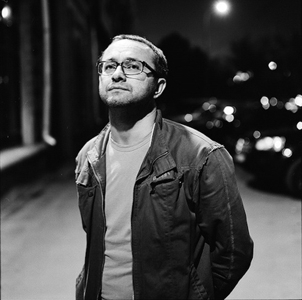Modern Russian Mastery on a Grand Scale
12/31/2014
Stunning images help make Andrey Zvyagintsev's Leviathan the masterpiece it is. Many of them evoke the primeval setting of a story about power and corruption in the northernmost reaches of contemporary Russia. Towering cliffs face the Barents Sea. A whale surfaces in the heaving waves. Beaches are littered with the wreckage of boats, along with a whale skeleton. One of the most memorable images bespeaks power in a shocking guise. A house in a coastal fishing town has been vacated; the camera surveys its silent dining room, where potted plants still perch on a window sill overlooking a bay, and dishes remain on the table. Suddenly a monster comes crashing in. It's an excavator bucket with a giant steel claw that smashes windows, tears down the wall and, like a mad sci-fi creature swinging back and forth, devours every trace of life that the house contained. In the grand plan of this film, wreckage lies at every turn.
The story is simple enough at first. It pits Kolia, a handyman and mechanic played by Alexeï Serebriakov, against the town's mayor, a corrupt brute named Vadim (Roman Madianov). Kolia, his pretty young wife Lilya ( Elena Liadova ) and his teenage son by a previous marriage, Roma (Sergueï Pokhodaev), live in the pleasant frame house that Kolia grew up in. Vadim wants to seize the property, plus Kolia's little auto repair shop, and pay him a fraction of what everything is worth. The battle lines are quickly drawn. Both men are hotheads, both drink too much; vodka and tobacco play prominent roles in this disconsolate culture. That's where any equivalence ends, though. For all his faults, Kolia is a loving husband, a caring father and a good guy. Overmatched in his struggle against local authority, he enlists the help of an old Army buddy, Dimitri (Vladimir Vdovitchenkov), who has become a successful, self-assured Moscow lawyer.
All politics may be local, but the script, which was written by Oleg Negin and the director, finds larger meaning—meaning as large as Russia, and beyond—in the machinations of Vadim and his henchpersons in the town government. (A photo of Russian president Vladimir Putin has a prominent place on the mayor's office wall.) Kolia's quest for justice is surreal, to say the least. He can't lodge a complaint because bureaucrats are either away from their posts, or spiritually and intellectually out to lunch; the government structure is an empty shell. Dimitri keeps declaring his faith in facts, and he has, in fact, dug up some useful dirt from the mayor's dubious past. But Vadim is a formidable adversary who draws strength from his bottomless scorn for the town's citizens. "You're all insects," he snarls. "You've never had any f— rights and you never will!"
So far I've described a drama in which one or the other antagonist might be expected to prevail in a conventional climax. But the movie expands, breathtakingly, into mordant humor, impenetrable mystery, ferocious satire and classic tragedy. Mr. Zvyagintsev's direction is so precise, his concern for concision so steadfast, that screen time is never squandered on what can be inferred. Every moment in Leviathan is emotionally charged. Every image has its impact. (Mikhail Krichman's magnificent cinematography shows that somber needn't mean murky; the movie seems infused with a simmering inner light.)
Kolia's friend Stepanych (Sergueï Bachurskly), a slack-jawed colonel in the traffic police, celebrates his birthday by taking Kolia and his family, as well as Dimitri, to the countryside for an outing. Booze mixes menacingly with guns until target practice is enlivened by Stepanych setting up, as targets, framed photographs of Soviet leaders from Lenin to Gorbachev. ("Got anyone more current?" Kolia asks. "It's too early for the current ones," Stepanych replies, a glint in his hitherto glassy eyes. "Not enough of a historical perspective. Let them ripen on the wall a bit.") Then a fateful event, described obliquely but unseen, changes the story's dynamic; no longer does Vadim have a monopoly on moral corruption.
Every character comes alive through flawless performances. Poignant Lilya yearns for a better life. Suave Dimitri urges her and Kolia to cut loose from their little town and move to Moscow. (This isn't Chekhov, where characters dream of going to Moscow, but Russia in the time of Putin, when such dreams are thwarted by grim reality.) Unsparing in its portrayal of government, as represented by the porcine Vadim, the film is scathing in its attitude toward the Church, as personified by a sanctimonious, power-obsessed Orthodox cleric who urges Vadim to "pay attention to divine matters." (All the more remarkable that the Russian government put Leviathan up for an award in this year's Oscars.)
The film's title can be taken as a reference to the Leviathan of Thomas Hobbes, who argued for mankind surrendering freedom in exchange for protection from an absolute sovereign, but equally to the ocean creature summoned up in the Book of Job. Kolia, blameless from the start, ends as a modern Job, the victim of despots in a godless land. Beset by bottomless grief, he takes a slug of vodka from a bottle and asks, in timeless fashion, "Why? Why, Lord?" The film offers no answer in a majestic coda that plays scudding clouds and pounding waves against a pulsating Philip Glass score. But the closing shot is very much of this time—an oil drum swept on foam toward a rocky coast. Is it mere coincidence that the drum is bright red, or does this last cryptic image suggest a Russia that is itself bobbing aimlessly, and headed for the rocks?
Joe Morgenstern
"The Wall Street Journal"
